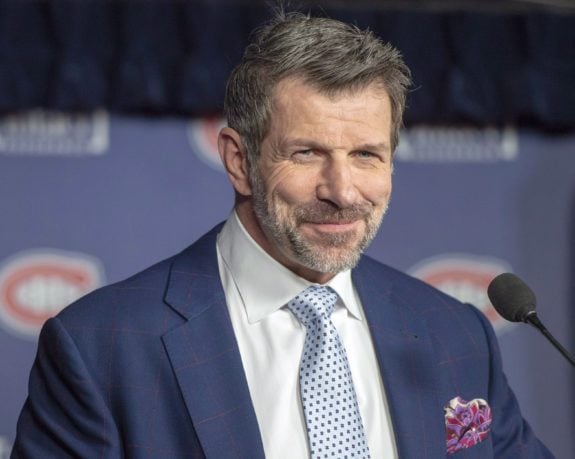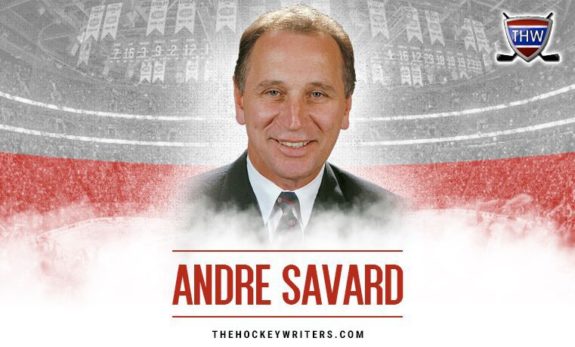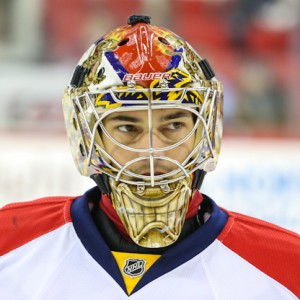In this third installment of a four-part series comparing Montreal Canadiens general manager Marc Bergevin to his four immediate predecessors, we take a look at Andre Savard. Originally published in Aug. 2018
It’s been 25 years since the Habs last won the Stanley Cup. In that time, players have come and gone, but so have GMs. Five in fact have been hired since Serge Savard was let go in 1995. Only four of those five have followed him out the door though, with Bergevin being the sole exception… for now.

How do they each stack up against (Serge) Savard? Not well, it turns out. So, we’ll settle for comparing Bergevin to the other four who have failed to fill the former’s shoes, starting with Pierre Gauthier, continuing with Bob Gainey and now (Andre) Savard.
Tale of the Tape: Bergevin vs. Savard
Time Served: Nov. 20, 2000 – June 2, 2003 (Savard); May 2, 2012 – now (Bergevin)
No. of Playoff Appearances/ Seasons: 1/3 (Savard); 4/7 (Bergevin)
No. of Division Titles/ Seasons: 0/3 (Savard); 3/7 (Bergevin)
No. of Playoff Rounds Won/ Seasons: 1/3 (Savard); 3/7 (Bergevin)
No. of Draft Home Runs/ Picks (home run being a projected long-term, good fit):
- 1/ 14 (Savard; Tomas Plekanec at No. 71 in 2001)
- 3/ 50 (Bergevin excluding last draft; Artturi Lehkonen at No. 55 in 2013, Victor Mete at No. 100 in 2016, Jesperi Kotkaniemi at No. 3 in 2018)
Best/ Worst Free Agents Signed (based on contract and expected/ actual contributions):
- Yanic Perreault/ Randy McKay (Savard)
- Alexander Radulov/ Karl Alzner (Bergevin)
Best/ Worst Free-Agent Re-Signings:
- Saku Koivu ($3.3 million over one year)/ Patrice Brisebois ($12 million over three years) (Savard)
- Max Pacioretty ($27 million over six years)/ Carey Price ($84 million over eight years) (Bergevin)
Signature Trade:
- Trevor Linden, Dainius Zubrus, 2001 second-round pick for Jan Bulis, Richard Zednik, 2001 first-round pick (Savard)
- P.K. Subban for Shea Weber (Bergevin)
The Underrated Andre Savard
Andre Savard may very well be the best general manager of the darkest era in Canadiens history. Some may argue that’s not saying much, as he took over a team on the verge of finishing out of the playoffs for a third straight season. On the contrary, it doesn’t give him enough credit.

Under his guidance, the Habs earned their first playoff-game victory in the second round since they won the Stanley Cup in 1993. The Habs were actually close to taking that second-round series against the Carolina Hurricanes in 2002 or at least taking a 3-1 series lead before an infamous third-period meltdown in Game 4. The Habs would lose in overtime despite having taken a 3-0 lead into the third period. The loss helped shift the momentum in the series, which the Hurricanes won.
That was a soul-crushing defeat, but the season, during which Saku Koivu returned at the very end after his battle with cancer, provided fans with a newfound sense of optimism. Granted, they ended up missing the playoffs altogether the following season, but the light at the end of the tunnel had been practically blinding at that point.
Sandwiched Between Houle and Gainey
Of course the Habs ended up replacing Savard with Gainey, which maybe brightened the light even more. It also painted the wrong picture. It’s not that Savard failed the organization. He was brought into a no-win situation, promoted from director of player personnel upon the firing of Rejean Houle, at which point the Habs had dropped to last place in the entire league by Nov. 20 with a 5-13-2 record.
Making the playoffs that 2000-01 season would have taken a miracle, which wasn’t in the cards. So, instead, Savard rebuilt, making several savvy moves that helped to make the Canadiens playoff-ready once again for 2001-02.
He traded Trevor Linden and Dainius Zubrus to the Washington Capitals for Jan Bulis and Richard Zednik, which proved to be a great move to get younger and, frankly, better. He also signed free agents Yanic Perreault and Doug Gilmour, two underrated acquisitions who probably provided more offense than you remember. He even drafted arguably the closest thing the Habs would get to a No. 1 center for the next two decades in Tomas Plekanec that summer.

Of course, the emergence of Jose Theodore as a Hart Memorial Trophy-caliber goalie that season certainly didn’t hurt. Seeing as Bergevin has openly embraced Carey Price as the backbone of his teams, it at the very least shouldn’t be held against Savard. Nor should it how, once Theodore dropped back down to Earth the following season just as Price did in 2017-18, the team struggled mightily.
Following that disappointing 2002-03 season, Savard didn’t get fired. That’s key. He stepped aside, facilitated the hiring of Gainey and became his assistant GM, getting a new contract in the process. That’s not a sign of failure. Nor is it a sign of frugality on the part of a Habs team arguably looking to get all they can out of a previous hire who didn’t work out. It’s a sign Savard, who had zero managerial experience before taking the Habs’ reins, knew his limitations and that a Stanley Cup-winning GM who had a history with the team might be a better fit. It’s a show of mutual respect.
Savard vs. Bergevin
Contrast that with the reign of Bergevin, who hadn’t had any experience as a GM prior to coming on in 2012 either. While things started off well for Bergevin, the Habs have only recently been able to pull out of their downward spiral of recent seasons. As of the 2019 offseason, they have still missed the playoffs in three of the last four seasons.
There’s no denying that, superficially speaking, Bergevin’s tenure has been more successful based on the sheer numbers. Delve deeper though. It becomes clear Bergevin should take a page out of his predecessor’s book. Savard’s may have been relatively short and anti-climactic, but it’s definitely worth a nostalgic re-read, if only for the moral of the story: It’s arguably not where you start or finish that counts, but how you run the race instead.
Savard’s tenure could have gone smoother, but, ultimately, he left the Habs in better shape for the long term than when he had been hired. All things being equal, maybe in better shape than any other GM in this series, Gainey (and Bergevin) included.